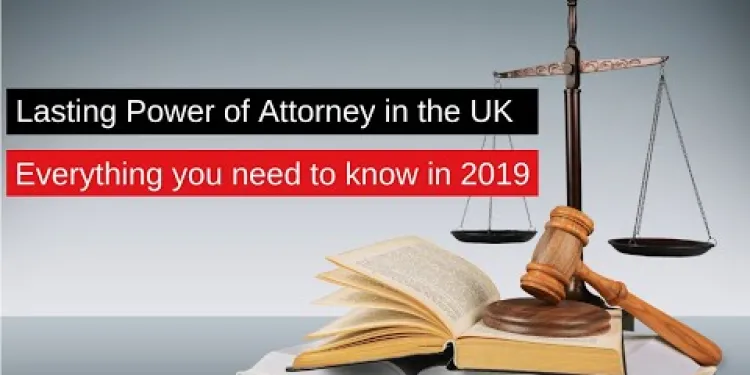Find Help
More Items From Ergsy search
-

Lasting Power of Attorney UK - A 2023 Guide
Relevance: 100%
-

What is a Lasting Power of Attorney?
Relevance: 78%
-

What is a lasting Power of Attorney?
Relevance: 76%
-

How to Set Up a Lasting Power of Attorney
Relevance: 74%
-

What is a Power of Attorney?
Relevance: 73%
-

What Is A Power of Attorney
Relevance: 71%
-

Can the Attorney General override a court decision?
Relevance: 39%
-

Can the Attorney General in the UK intervene in legal proceedings?
Relevance: 37%
-

Can the Attorney General of the UK make decisions on public prosecution matters?
Relevance: 35%
-

Is the position of Attorney General unique to the UK?
Relevance: 35%
-

What is the role of the Attorney General in the UK?
Relevance: 33%
-

What is the Attorney General in the UK?
Relevance: 33%
-

What is the Attorney General’s Office?
Relevance: 33%
-

Can the Attorney General be involved in judicial reviews?
Relevance: 33%
-

How does the Attorney General relate to the judiciary?
Relevance: 32%
-

Does the Attorney General in the UK handle prosecution cases?
Relevance: 32%
-

How is the Attorney General involved in the legislative process in the UK?
Relevance: 32%
-

What are the types of LPA?
Relevance: 32%
-

Does the Attorney General in the UK have to be a lawyer?
Relevance: 31%
-

What is the historical significance of the Attorney General's role in the UK?
Relevance: 31%
-

Is the Attorney General in the UK a member of the cabinet?
Relevance: 31%
-

Is the Attorney General part of the UK government?
Relevance: 31%
-

Who appoints the Attorney General in the UK?
Relevance: 30%
-

What is the difference between the Attorney General and the Solicitor General in the UK?
Relevance: 30%
-

Court of Protection
Relevance: 29%
-

Is the Attorney General involved in human rights issues?
Relevance: 29%
-

How long does the Attorney General serve in the UK?
Relevance: 29%
-

Does the Attorney General have a role in international law?
Relevance: 27%
-

What influence does the Attorney General have over the legal profession?
Relevance: 26%
-

Three Debt Free Methods in 2023 | Free Debt Calculator Tracker
Relevance: 24%
-

What legal resources are available for carers of Alzheimer's patients?
Relevance: 24%
-

Can my attorney check my immigration status for me?
Relevance: 22%
-

How long do hosepipe bans last?
Relevance: 22%
-

UNDERSTANDING YOUR STUDENT LOAN: A GUIDE FOR ENGLISH STUDENTS STARTING AN UNDERGRADUATE COURSE 2023
Relevance: 21%
-

How long do the effects of ketamine last?
Relevance: 20%
-

How long does Botox last?
Relevance: 20%
-

Navigating Personal Injury Claims: What You Need to Know Post-2023
Relevance: 20%
-

How long do the effects of Botox last?
Relevance: 20%
-

How long does chickenpox last?
Relevance: 20%
-

How long do cold sores last?
Relevance: 20%
Lasting Power of Attorney UK - A 2023 Guide
What is a Lasting Power of Attorney?
A Lasting Power of Attorney (LPA) is a legal document that allows you to appoint one or more people to help you make decisions or to make decisions on your behalf. This is useful in situations where you no longer have the mental capacity to make your own decisions or prefer a trusted individual to handle matters for you.
Types of Lasting Power of Attorney
There are two main types of LPA in the UK:
- Health and Welfare LPA: This type of LPA gives your attorney the power to make decisions about your daily care, medical treatment, and even your living arrangements.
- Property and Financial Affairs LPA: This type allows your attorney to manage your finances, including paying bills, collecting benefits, and selling property on your behalf.
How to Set Up a Lasting Power of Attorney
To set up a Lasting Power of Attorney, you'll need to complete specific forms provided by the Office of the Public Guardian (OPG). The forms must be signed and witnessed and then registered with the OPG before they can be used. The registration process can take up to 10 weeks. There may also be a fee involved, though exemptions or reductions may apply depending on your financial circumstances.
Choosing an Attorney
Choosing the right attorney is crucial as they will have significant control over your affairs. It’s important to select someone you trust and who understands your preferences and values. Many people choose family members, but you could also opt for a professional such as a solicitor or an accountant.
Benefits of Making an LPA
Making an LPA ensures that your affairs will be handled according to your wishes should you lose the capacity to make decisions. It provides peace of mind and reduces the burden on family members, who might otherwise face a lengthy and expensive court process to gain similar authority.
Conclusion
In summary, a Lasting Power of Attorney is a crucial document for safeguarding your future. As of 2023, the process remains straightforward but requires careful consideration and planning. Taking the time to set up an LPA can provide significant security for both you and your loved ones.
Lasting Power of Attorney UK - A 2023 Guide
What is a Lasting Power of Attorney?
A Lasting Power of Attorney (LPA) is a paper that lets you pick someone to help you make choices. They can also make choices for you if you can't do it yourself. This is helpful if you can't think clearly anymore or want someone you trust to help you.
Types of Lasting Power of Attorney
There are two main types of LPA in the UK:
- Health and Welfare LPA: This lets your helper decide things about your daily care, medical treatment, and where you live.
- Property and Financial Affairs LPA: This lets your helper manage your money. They can pay bills, collect benefits, and sell things for you.
How to Set Up a Lasting Power of Attorney
To make a Lasting Power of Attorney, you fill out forms from the Office of the Public Guardian (OPG). You must sign these forms and have someone watch you sign them. Then, send the forms to the OPG. It can take up to 10 weeks to be ready. You might have to pay, but sometimes the cost is lower if you don’t have much money.
Choosing an Attorney
Pick someone you trust to help make important decisions for you. This person will have a lot of power over what happens to you and your things. Many people choose family members. You can also choose a professional like a lawyer or accountant.
Benefits of Making an LPA
Making an LPA makes sure your wishes are followed if you can’t make decisions yourself. It gives you and your family peace and stops them from having to go to court, which can take a long time and cost a lot of money.
Conclusion
In short, a Lasting Power of Attorney is important for your future. As of 2023, it is easy to set up but needs careful thought and planning. Making one can protect you and your loved ones.
Frequently Asked Questions
What is a Lasting Power of Attorney (LPA)?
A Lasting Power of Attorney (LPA) is a legal document that allows you to appoint someone (an attorney) to make decisions on your behalf if you lose mental capacity or no longer wish to make decisions for yourself.
What are the different types of LPA?
There are two types of LPA: Health and Welfare LPA, which covers decisions about your health and personal welfare, and Property and Financial Affairs LPA, which covers decisions about your financial and property matters.
Who can be an attorney?
An attorney can be anyone over 18 who you trust, such as a family member, friend, or a professional like a solicitor. They should have the skills to make decisions on your behalf.
How do I make an LPA?
You can make an LPA by completing the necessary forms available from the Office of the Public Guardian (OPG) website. Once completed, the forms must be signed and witnessed before being registered with the OPG.
Do I need a solicitor to make an LPA?
No, you do not need a solicitor to make an LPA. However, you may choose to seek legal advice to ensure correct completion and registration of the forms.
How much does it cost to register an LPA?
As of 2023, the fee to register an LPA is £82 per document in England and Wales. Fee reductions or exemptions may be available based on your financial circumstances.
How long does it take to register an LPA?
It can take up to 10 weeks to register an LPA, provided there are no mistakes in the application and no objections are raised.
Can I cancel my LPA?
Yes, you can cancel your LPA at any time as long as you still have mental capacity. This is done by sending a written notice called a Deed of Revocation to the OPG.
What is 'mental capacity'?
Mental capacity refers to the ability to make decisions for yourself. To have mental capacity, you must be able to understand, retain, and weigh up information relevant to a decision and communicate your decision.
What happens if I don't have an LPA?
If you lose mental capacity without an LPA, your family or close friends would need to apply to the Court of Protection to become your deputy, which can be a long and costly process.
Can I make changes to my LPA once it is registered?
You cannot amend an existing LPA once it is registered. If you wish to make changes, you must revoke the current LPA and create a new one.
Who can witness the signing of my LPA?
Any independent adult (over 18) can witness the signing of your LPA, but they must not be one of your attorneys or replacements.
What powers does an attorney have under a Health and Welfare LPA?
Under a Health and Welfare LPA, an attorney can make decisions about your daily care, medical treatment, and living arrangements, but only if you cannot make these decisions yourself.
What powers does an attorney have under a Property and Financial Affairs LPA?
An attorney under a Property and Financial Affairs LPA can manage your bank accounts, pay bills, collect your benefits or pension, and sell your property, either when you lose mental capacity or immediately if specified.
What should I consider when choosing an attorney?
When choosing an attorney, consider their reliability, understanding of your wishes and best interests, ability to handle financial matters, and willingness to take on the responsibility.
What is a Lasting Power of Attorney (LPA)?
A Lasting Power of Attorney (LPA) is a legal paper. It lets you pick someone to help make choices for you.
This person can help if you become ill or can't decide for yourself.
Some people use tools like pictures or videos to understand more about LPAs.
A Lasting Power of Attorney (LPA) is a special paper. It lets you pick someone you trust to make choices for you. This is important if you can't make choices yourself later.
What are the different types of LPA?
LPA means 'Lasting Power of Attorney'. It is a legal form.
There are two kinds of LPA:
- Health and Care LPA: This lets someone help you make decisions about your health and how you are looked after.
- Financial LPA: This lets someone help you manage your money and pay bills.
It is important to choose someone you trust for an LPA. You can ask someone to explain more if you do not understand.
There are two kinds of LPA. One is for Health and Welfare. It helps with choices about your health and how you live. The other is for Property and Money. It helps with choices about your money and things you own.
Here are some tips to help you understand this better:
- Use simple words when talking about it.
- Ask someone you trust to explain it to you.
- Look for pictures or videos that can help you understand more.
- Take your time and go over the information as much as you need.
Who can be a lawyer?
A lawyer is a person who helps others with legal problems. To be a lawyer, you need to go to law school and learn a lot about the law.
Here are some simple steps to become a lawyer:
- Finish high school.
- Go to university and study hard.
- Go to law school to learn about law.
- Pass a big test called the bar exam.
- Get a license to work as a lawyer.
If you need help reading, you could ask a friend to read with you or use a reading app. Taking breaks can also help you understand better.
An attorney is a person who can help you make decisions. They need to be someone you trust. They can be a family member, a friend, or a professional like a lawyer. They should be good at making decisions for you.
How do I make an LPA?
Here is how to make an LPA (Lasting Power of Attorney) in easy steps:
- Get a special form. You can ask for help to get it.
- Fill in your name and details on the form.
- Pick someone you trust to help you. This person is called an 'attorney'.
- Ask them if they agree to help you.
- Make sure you both sign the form together.
- Send the form to the right office. They will check it for you.
Here are some helpful tips:
- Ask a friend or family member to help you fill the form.
- Use a big pen and write clearly.
- Take your time and do one step at a time.
- You can use a computer to make the letters bigger and easier to read.
If you need more help, ask a trusted friend or use a support service for advice.
You can make an LPA by filling out special forms. You can find these forms on the Office of the Public Guardian (OPG) website. After you fill out the forms, they need to be signed and watched by someone. Then, you send the forms to the OPG to register them.
Here are some things that can help you:
- Ask a friend or family member to help you fill out the forms.
- Use a highlighter to mark important parts of the forms.
- Take breaks if the forms feel too long or hard to understand.
- Visit the OPG website for more help and information.
Do I need a lawyer to make an LPA?
Here is what you need to know:
- LPA: LPA means Lasting Power of Attorney. This is a paper that lets someone help you make choices if you can't.
- Do you need a lawyer?: No, you don't need a lawyer to make an LPA. But a lawyer can help if you have questions.
- If you want to do it yourself, here are some tips:
- Use simple language.
- Ask a friend or family member to help.
- Check your choices twice.
Remember, if you feel unsure, it is okay to ask someone for help.
No, you do not need a lawyer to make an LPA. But, you can ask a lawyer for help if you want to make sure you fill out all the forms right and get them registered.
How much money do you need to pay to register an LPA?
When you want to make a legal document called an LPA (Lasting Power of Attorney), you need to pay some money. This money is called a fee.
If you find it hard to read, you can ask someone to help you. You can also use tools that read the words out loud for you or make the letters bigger on the screen.
If you want to register an LPA (Lasting Power of Attorney) in 2023, it costs £82 for each document in England and Wales. You might pay less or nothing at all if you don't have much money.
How long does it take to get an LPA?
Getting an LPA can take a long time. Usually, it takes about 8 to 10 weeks. But sometimes, it might take longer.
An LPA is a legal paper. It lets someone you trust help you make decisions.
Here are some tips to help:
- Ask someone to help you with the forms.
- Check all the information twice to make sure it's correct.
- Use a calendar to mark the time it might take.
It can take up to 10 weeks to register an LPA if there are no mistakes and no one objects.
Here are some tips to help:
1. Check your application carefully to avoid mistakes.
2. Ask someone to look over your application with you.
3. Use a checklist to make sure everything is correct.
Can I stop my LPA?
You can stop an LPA if you change your mind. An LPA is a "Lasting Power of Attorney". It lets someone you trust help you make decisions.
Here are some easy steps:
- Write to the Office of the Public Guardian to tell them you want to stop the LPA.
- Use simple words to say you don’t want it anymore.
- Ask someone you trust to help you write the letter if you need support.
Tools that can help:
- Friends or family: They can help you understand what to do.
- Helpline: You can call a helpline for advice.
You can stop your LPA whenever you want, but you need to be able to make decisions. To do this, you write a letter called a Deed of Revocation and send it to the OPG.
For help writing the letter, you might use a computer or ask someone you trust.
What does 'mental capacity' mean?
'Mental capacity' means if someone can make their own choices.
This can be about big or small things.
Like choosing what to eat or where to live.
Sometimes, people might need help to decide.
Tools like a picture chart can be useful.
It is okay to ask someone you trust for advice.
Mental capacity means you can make choices for yourself. To have mental capacity, you need to do a few things:
- Understand the information you need to make a choice.
- Remember the information long enough to make the choice.
- Think about different options and their good and bad points.
- Let others know what your choice is.
Here are some tools and tips that can help:
- Use pictures or drawings to help understand information.
- Ask someone to explain things in simple words.
- Take your time and ask for breaks if you need them.
- Use a buddy system. Talk with someone you trust before making a decision.
What happens if I don't have an LPA?
If you don’t have an LPA, no one can make decisions for you if you can’t. LPA stands for Lasting Power of Attorney. It lets someone help you with important choices, like about your money or health.
If you don’t have one and you can’t decide things by yourself, your family might have to ask a court for help. This can take a lot of time and money.
It’s good to talk to someone you trust about making an LPA. You can also ask for help from a friend, family member, or a support worker.
If you cannot make decisions and do not have a Lasting Power of Attorney (LPA), your family or friends will need help from the Court of Protection. This is called becoming a deputy. It can take a long time and be expensive.
Can I change my LPA after it is registered?
Yes, you can change your LPA after it is registered.
Here are some ways you can do this:
- You can make small changes, like updating your address. You need to tell the right office about these changes.
- If you want big changes, like adding a new person, you will need to make a new LPA. This will cost some money.
If you need help, you can:
- Ask someone you trust for advice.
- Contact the office that deals with LPAs for guidance.
Remember, it is important to make sure your LPA is up to date.
You cannot change an LPA after it is registered. If you want to make changes, you have to cancel the old LPA and make a new one.
Who can watch me sign my LPA?
When you sign your LPA (Lasting Power of Attorney), someone needs to watch you do it. This person is called a 'witness'.
A witness can be:
- a friend
- a neighbor
- someone at work
The witness cannot be someone who will use the LPA to make choices for you.
A witness should:
- Be at least 18 years old
- See you sign your name
- Be able to sign their own name
It is okay to use:
- a magnifying glass to help read the papers
- a pen with a comfortable grip
- a quiet room with good light
Anyone who is a grown-up (over 18) can watch you sign your LPA. But it cannot be someone who will be your attorney or a backup attorney.
What Can an Attorney Do with a Health and Welfare LPA?
A Health and Welfare LPA is a paper that lets someone help you make choices about your life.
The person who helps you is called an "attorney."
Here are things an attorney can do:
- They can help you choose where to live.
- They can help make decisions about your medical care.
- They can help with your daily activities, like eating and washing.
If you need help to read or understand, ask someone you trust to explain.
You can use tools like pictures or videos to make it clearer.
With a Health and Welfare LPA, a helper can decide about your daily care, health treatment, and where you live. But they can only do this if you can't decide for yourself.
If it's hard to follow this, you can ask a friend or family member to read it with you. You can also use tools like text-to-speech, which can read the words aloud. This can make it easier to understand.
What Can an Attorney Do with a Property and Money LPA?
A person called an attorney can help you with your money and things you own. They can look after your bank accounts, pay your bills, collect money like benefits or pension, and even sell your things if needed. This can happen if you find it hard to make decisions or right away if you say it's okay.
Here are some tips that might help:
- Get help from someone you trust: Choose a person you trust to help make decisions.
- Use pictures or symbols: They can help you understand information better.
- Ask questions: It’s okay to ask if you don’t understand something.
What should I think about when picking a lawyer?
When you pick a lawyer, think about if they are trustworthy. See if they can understand what you want and what is best for you. Make sure they can handle money things and are ready to help you.
Useful Links
This website offers general information and is not a substitute for professional advice.
Always seek guidance from qualified professionals.
If you have any medical concerns or need urgent help, contact a healthcare professional or emergency services immediately.
Some of this content was generated with AI assistance. We’ve done our best to keep it accurate, helpful, and human-friendly.
- Ergsy carfully checks the information in the videos we provide here.
- Videos shown by Youtube after a video has completed, have NOT been reviewed by ERGSY.
- To view, click the arrow in centre of video.
- Most of the videos you find here will have subtitles and/or closed captions available.
- You may need to turn these on, and choose your preferred language.
- Go to the video you'd like to watch.
- If closed captions (CC) are available, settings will be visible on the bottom right of the video player.
- To turn on Captions, click settings .
- To turn off Captions, click settings again.
More Items From Ergsy search
-

Lasting Power of Attorney UK - A 2023 Guide
Relevance: 100%
-

What is a Lasting Power of Attorney?
Relevance: 78%
-

What is a lasting Power of Attorney?
Relevance: 76%
-

How to Set Up a Lasting Power of Attorney
Relevance: 74%
-

What is a Power of Attorney?
Relevance: 73%
-

What Is A Power of Attorney
Relevance: 71%
-

Can the Attorney General override a court decision?
Relevance: 39%
-

Can the Attorney General in the UK intervene in legal proceedings?
Relevance: 37%
-

Can the Attorney General of the UK make decisions on public prosecution matters?
Relevance: 35%
-

Is the position of Attorney General unique to the UK?
Relevance: 35%
-

What is the role of the Attorney General in the UK?
Relevance: 33%
-

What is the Attorney General in the UK?
Relevance: 33%
-

What is the Attorney General’s Office?
Relevance: 33%
-

Can the Attorney General be involved in judicial reviews?
Relevance: 33%
-

How does the Attorney General relate to the judiciary?
Relevance: 32%
-

Does the Attorney General in the UK handle prosecution cases?
Relevance: 32%
-

How is the Attorney General involved in the legislative process in the UK?
Relevance: 32%
-

What are the types of LPA?
Relevance: 32%
-

Does the Attorney General in the UK have to be a lawyer?
Relevance: 31%
-

What is the historical significance of the Attorney General's role in the UK?
Relevance: 31%
-

Is the Attorney General in the UK a member of the cabinet?
Relevance: 31%
-

Is the Attorney General part of the UK government?
Relevance: 31%
-

Who appoints the Attorney General in the UK?
Relevance: 30%
-

What is the difference between the Attorney General and the Solicitor General in the UK?
Relevance: 30%
-

Court of Protection
Relevance: 29%
-

Is the Attorney General involved in human rights issues?
Relevance: 29%
-

How long does the Attorney General serve in the UK?
Relevance: 29%
-

Does the Attorney General have a role in international law?
Relevance: 27%
-

What influence does the Attorney General have over the legal profession?
Relevance: 26%
-

Three Debt Free Methods in 2023 | Free Debt Calculator Tracker
Relevance: 24%
-

What legal resources are available for carers of Alzheimer's patients?
Relevance: 24%
-

Can my attorney check my immigration status for me?
Relevance: 22%
-

How long do hosepipe bans last?
Relevance: 22%
-

UNDERSTANDING YOUR STUDENT LOAN: A GUIDE FOR ENGLISH STUDENTS STARTING AN UNDERGRADUATE COURSE 2023
Relevance: 21%
-

How long do the effects of ketamine last?
Relevance: 20%
-

How long does Botox last?
Relevance: 20%
-

Navigating Personal Injury Claims: What You Need to Know Post-2023
Relevance: 20%
-

How long do the effects of Botox last?
Relevance: 20%
-

How long does chickenpox last?
Relevance: 20%
-

How long do cold sores last?
Relevance: 20%


